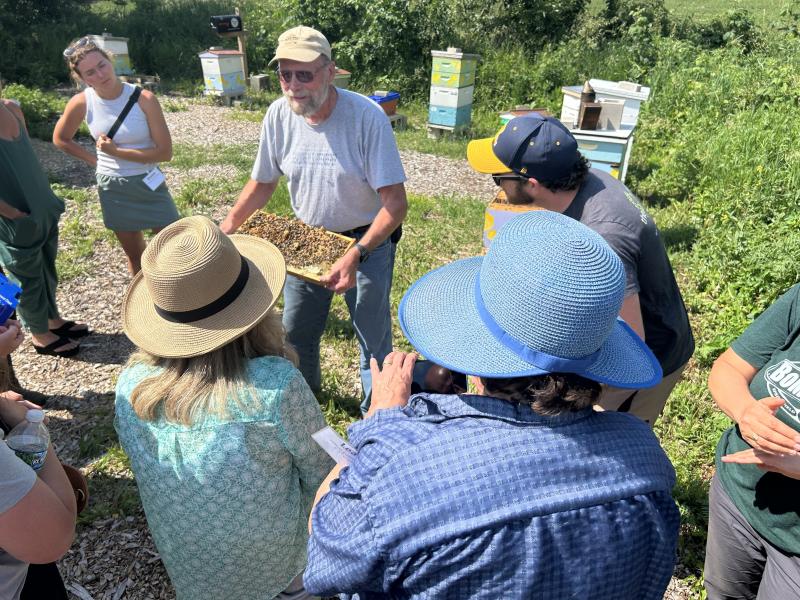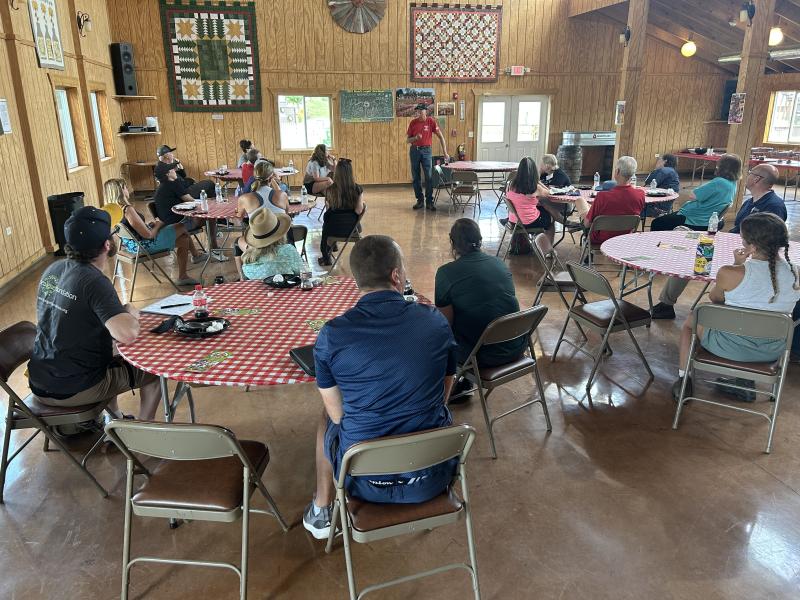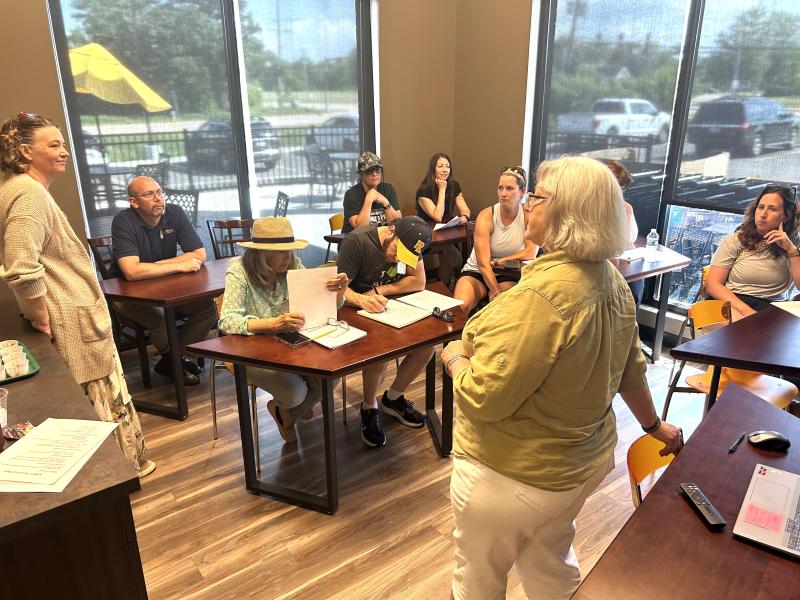By Mike Orso
Some northeast Illinois school teachers recently absorbed a wealth of information about the local farming and food scene, eager to incorporate as much as they can into new classes that will start in just a little more than a month.
“I thought it was amazing,” said Cassy Mate, an English Language Arts & Literature elementary and junior high teacher for Prairie Grove District 46, about the Summer Agriculture Institute (SAI) held last month by the Lake and McHenry County Farm Bureaus. “I went in there hoping to gather information to add to my accelerated literature unit that I’m going to be teaching which is called ‘People in the Environment.’ I was looking for things to get the kids more hands on, more engaged in that besides just reading some articles we have picked out. So, I was eager to get resources.”
A dozen elementary and high school teachers participated in the nearly weeklong institute, which this year began in Lake County and included visits there to dairy, fruit and vegetable and tree farms in the northeastern-most corner of the state.
“From the first farm we visited, I was hooked,” said Don Trinite, a Special Education Science teacher at School District 116’s Round Lake Senior High School. “My mind was spinning about all sorts of ways to incorporate more ag in the classroom for my biology class specifically. We do a lot of work with plants basically from day one all-of-the-way until the end of school. This whole thing opened up a lot more avenues for me.”
Midweek, the group spent an entire day in a makeshift classroom, taking an ag quiz, learning about the Bloomington-based Illinois Agriculture in Classroom program, and discovering resources available to incorporate information about farming and food in curriculums. Led by Katie Vanderstappen, McHenry County Farm Bureau (MCFB) Agriculture in the Classroom Coordinator, and Kevin Daugherty, Director of the Illinois Center for Agricultural Engagement, the participating teachers even ended up with a homework assignment.
“There are just so many resources such as the Illinois Farm Bureau’s Agriculture in the Classroom website,” said Chelsea Oates, a Special Education Kindergarten teacher in Woodstock District 200’s Verda Dierzen Early Learning Center. “It just made it really easy to find a connection, find something that will fit.”
Some specific McHenry County stops on the institute’s third day included bee hives at McHenry County College’s Center for Agrarian Living in Crystal Lake, the 1-year-old FoodShed Co-op in Woodstock, and the Bull Valley Equestrian Center with its Operation Wild Horse program. It works with active-duty military, veterans and their families to build a bond through interactions with wild mustang and burro herds.
“When I got to Operation Wild Horse, all-of-a-sudden it dawned on me, ‘Why am I having kids find a problem,’” said Prairie Grove’s Cassy Mate. “Why am I doing that, I should have them start researching careers of people fixing problems we have. Ag is definitely doing that left and right.”
Additional McHenry County farms that the teachers visited included Von Bergen’s Country Market in Hebron, Richardson’s Christmas Tree & Adventure Farm in Spring Grove, Cody’s Farm and Orchard in Marengo, and the Fritz beef farm, Walter Seed and Piscasaw Gardens, all near Harvard. They also had lunch, a tour and experienced a tasting at Rush Creek Distilling in Harvard.
“The need for diversification emerged as a main theme throughout the farm visits,” said Round Lake’s Don Trinite. “On these trips we saw farms that were like, ‘Yeah we got corn and soybeans and pumpkins and sheep,’ and it’s like, ‘Oh, oh, and it’s not a petting zoo.’ The array of different farms, it opened-up my mind a lot.”
MCFB has held the annual teacher institute either solely or jointly with the general farm organization in Lake County for more than 25 years.
“If we can teach teachers about agriculture, we can reach a lot more individuals,” said Dan Volkers, MCFB Manager. “It’s important to share where food, fiber and fuel comes from.”
Teachers that participate in the SAI can obtain continuing education credits, which are required toward state teaching license renewal, or to be used toward a graduate’s degree. The three said they’d recommend the program to their fellow teachers.
“I thought it was really well-planned and engaging and I really loved all the stops,” said Woodstock’s Chelsea Oates. “I just felt very ignorant based on my knowledge of agriculture. You think it’s something you benefit from every day but you don’t realize the ingenuity, problem-solving, risk-taking and science that goes into getting food in our grocery stores.”

Larry Krengel of Hawk Hill Bee Farm in Marengo shares his expertise on bees with teachers participating in this year's SAI sponsored by the Lake and McHenry County Farm Bureaus. The Northern Illinois Beekeepers Association tends to its hives located at McHenry County College's Center for Agrarian Living near Crystal Lake.

Elementary and high school teachers from Lake and McHenry Counties participating in the Summer Agriculture Institute (SAI) sponsored by two county Farm Bureaus toured the Richardson family farm in Spring Grove, which includes Christmas trees, sunflowers, tulips and corn mazes created using Global Positioning System (GPS) technology. “They just don’t plant 140 acres of corn,” said Don Trinite, high school science teacher from Round Lake. “The planter plants the corn in the design, which blew my mind.”

Robert Richardson, center, shares his family's story with teachers participating in the LCFB and MCFB SAI at the farm near Spring Grove. "I'm building my curriculum for next fall with the help of the Farm Bureau," said Prairie Grove elementary and junior high teacher Cassy Mate. "Besides learning about farming, my big takeaway is the community that was built. I am hoping to bring that community into my classroom.

Half of the teachers participating in the SAI that visited The FoodShed Co-Op in Woodstock learned about its eight core principles and more in the store's community room with Chrissy Parker, left, FoodShed Events Coordinator, and Tracy Bordis, FoodShed General Manager, while the other half toured the co-op. The groups then switched to take in both components of the SAI stop. Woodstock teacher Chelsea Oates, far right, liked the community aspect of it and other SAI stops. "We just need to be more mindful of the food that we are purchasing and what we're eating for ourselves and our kids," she said.
